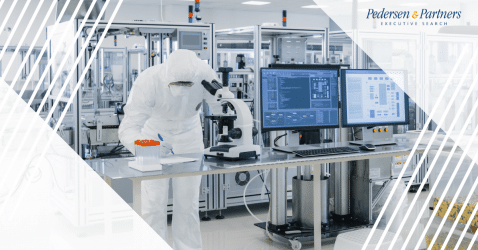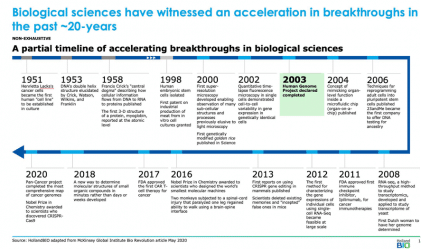Life Sciences & Healthcare Discussions: Biological Revolution – Advances and Challenges in Biotech and Gene Therapies
Pedersen & Partners’ Life Sciences & Healthcare Practice Team had the pleasure of welcoming Dr. Markwin Velders, an experienced biotech professional and the Chairman of HollandBIO (an association of 225 biotech companies).
Dr. Velders’ career in the biotech industry includes management roles in research, development, quality management and business development. He has worked as CSO at Dutch AM-Pharma, Business Unit Manager at TNO Biosciences, and CEO at SomantiX. After mediating the sale of the start-up T Cell Factory to Kite Pharma, he joined Kite Pharma to establish the company’s EU headquarters in Amsterdam, helping to advance clinical development, and playing a key role in preparing the commercial launch in Europe after Kite’s acquisition by Gilead. Most recently, he has been involved in the establishment of Kite’s chimeric antigen receptor (CAR-T) commercial manufacturing site in Hoofddorp, Netherlands.
Dr. Velders runs his own consultancy firm Prime Life Science, holds a PhD in Molecular Immunology and has authored or co-authored 40 scientific papers and publications.
The team enjoyed Dr. Velders’ presentation of McKinsey’s report (in association with HollandBIO) on key milestones and recent biotech advances, and shared a discussion about current successes and challenges in the development and commercialisation of gene therapies.
We live in unprecedented times when it comes to breakthroughs in the biological sciences. These are a few of the key scientific milestones achieved within the last 20 years.
Impact of the “Biological Revolution” on society and economic growth – McKinsey Report
Since the Human Genome Project was declared complete, we have been witnessing very rapid progress across the entire spectrum of biological science.
The potential impact of the global Bio Revolution can be recognised across four key domains:
- Human health & performance
- Agriculture, aquaculture & food
- Consumer products & services
- Materials, chemicals & energy
The Bio Revolution has already opened up many possibilities, and this is only set to increase.
In the area of human health, the Bio Revolution contributes not only to reduced disease burden, but also indirectly to increased happiness; it saves and extends lives, produces increased knowledge, promotes the development of new skills and talent, and influences productivity, GDP, exports and jobs.
McKinsey’s study shows that the Bio Revolution could generate a direct global economic impact amounting to EUR 2.5-4.2 trillion per annum up to 2050. Working with HollandBIO, McKinsey Institute has calculated that in the Netherlands alone, this contribution could amount to EUR 27-37 billion per year across various sectors, with the most significant effects on human health and performance, and agriculture.
The study developed different growth scenarios for 2030, in order to decide which one shows the best potential for the Netherlands as a leading EU biotech hub. Scaling biotech in the Netherlands could create about 60,000 additional jobs & raise annual GDP by approximately EUR 3 billion by 2030.
Key Challenges in Biotech Commercialisation
Cell and gene sector marketed products are still limited to a few key players, but it is clear that a lot of new technologies are being developed: applications, targets and the like. We are still in the beginning, and it is vital that we nurture ongoing developments, new ideas and technological improvements. As more attention is paid to these developments, the general interest will increase, and more money will flow into the innovation surrounding the technology. We are only at the start of what is possible in the field of cell and gene therapy. This field is far too expensive now, so what we need to do is to bring the price down. For example, we may not need to take the cells out of the patient; we may be able to treat in-patient and still get the same result. However, a lot of things need to happen in order for this scenario to be possible.
Competition is growing in centralised production facilities as well as hospital labs, and a lot of new ideas and opportunities can be seen. It is obvious that more money is available in the United States than in Europe; this is something that research organisations and governments should have in mind, and they should try to attract some of that money in order to facilitate research as well as commercialisation.
Attracting talent is proving to be key to success, but this challenge is not difficult to overcome with today’s mobility and knowledge.





